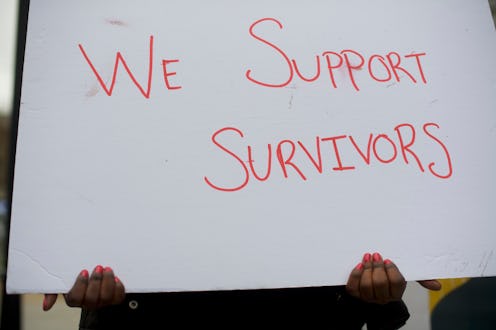News
A New Study Says That Women Of Color Are Especially Vulnerable To Reproductive Coercion

Stereotypes can be harmfully exclusionary when it comes to understanding abuse. While conversations about unhealthy and unsafe relationships are increasingly taking place in the public sphere, many of them fail to account for a startlingly common type of abuse — reproductive coercion. Women of color are especially vulnerable to this type of abuse, according to a new study in the journal BMJ Sexual & Reproductive Health, which explored just how prevalent it is.
Reproductive coercion can come in many forms, and it can include preventing someone from reproducing as well as forcing them to. Disregarding a woman's right to make decisions about her desire and capacity to reproduce — which includes surreptitiously slipping a condom off during sex (a form of abuse also known as "stealthing") — falls under its purview, too. The study, titled "Reproductive Control by Others: Means, Perpetrators and Effects," found that one in four women at sexual health clinics report experiencing coercion related to their reproductive choices.
"There are a few dynamics at play," Laura Palumbo, Communications Director for the National Sexual Violence Resource Center (NSVRC) tells Bustle. She says it isn't surprising to learn that women of color and young people are more likely to experience reproductive coercion because, she says, research suggests that they're already more likely to be victims of sexual violence and domestic abuse.
"All of these abuses are rooted in inequality and disparities of power," she says. "The racism and oppression faced by women of color directly impacts their access to health care and treatment. These same is true for young people who face barriers based on their age and may have less access to information and resources."
And these problems, Palumbo says, "are too often mirrored in relationships where imbalances of power lead to a dynamic of abuse."
Data on reproductive coercion is few and far between, though it's receiving increased attention in recent years. What research there is indicates that it's a type of abuse that covers everything from forced abortions to forced childbearing, and it's not frequently portrayed in mainstream representations of abuse.
"It’s something that sometimes people joke about," Adam Railsback, a digital services advocate for the National Domestic Violence Hotline and loveisrespect tells Bustle. This, he says, can make it seem like reproductive coercion is less serious than it actually is.
But the dangers are real, and they can last a lifetime. And if the abuse results in the survivor having a child, that can put the child in danger, too, he says.
"When someone does have a child with their abusive partner, there’s an obligation and there’s that sense of 'I need to stay with them for the child’s sake,'" he explains. "And sometimes, unfortunately, the result of that can be lethal."
As for why young women and women of color might be especially vulnerable to reproductive coercion, Railsback has a few ideas. Young people, he explains, often have to anticipate reactions from their families, which might not always be supportive. He explains that telling parents about reproductive coercion can be a source of shame for young people, whether because it's uncomfortable, or whether it's because they're not supposed to be dating someone, or having sex at all.
As for women of color, he says that one reason they might experience higher rates of reproductive coercion could have to do with the way that law enforcement treats them. He specifically pointed to black communities.
“If people are feeling victimized or harassed by the police, [if] they don’t feel that that’s a safe option, they’re not going to be calling them as a resource," he says.
And while it may be more likely to occur among certain subsets of the population, Railsback underscores that reproductive coercion can take place anywhere, and that anyone could struggle with it. "It can affect people of all genders," he says. "A lot of the time we just view cisgender women as the only people affected by reproductive coercion, but it can affect anyone."